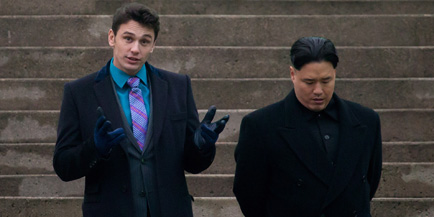The 400-Word Review: The Interview
By Sean Collier
January 1, 2015
BoxOfficeProphets.com

The plot, in case you were buried alive sometime last Wednesday afternoon: David Skylark (James Franco) is a mindless-yet-popular entertainment talk show host. When a news story mentions that North Korean dictator Kim Jong-un (Randall Park) is a fan of Skylark’s show, the anchor’s longtime producer, Aaron Rapoport (Seth Rogen) reaches out for an interview.
After Rapoport travels to China to meet his love interest (Diana Bang), Franco’s love interest (Lizzy Caplan) shows up on behalf of the CIA: they’d like the boys to assassinate Kim while they’re in town. On arrival, though, Skylark is surprised to find himself bonding with the supreme leader over absent father figures and a mutual love of margaritas; suddenly, Skylark doesn’t know if he can go through with the killing.
Like This is the End, the previous film co-directed by Rogen and Evan Goldberg, The Interview is obsessed with male relationships (and utterly uninterested in meaningful female characters, despite the filmmakers trying to write that oversight away with tongue-in-cheek nods to sexism). The Interview is about which compatriot Skylark will side with: Kim, a kindred spirit, or Rapoport. It’s something of a love story: the new flame or the longtime love? (For meta-commentary on what this says about the actors, please consult This is the End.)
In creating a real (albeit parodic) character out of Kim, The Interview actually does the North Korean leader more service than, say, the dreadful remake of Red Dawn (not to mention the treatment that Kim’s father received in Team America: World Police). But to assign any geopolitical heft to The Interview — whether as an act of war, like the real Kim would have you believe, or as a defiant stand for freedom, as the narrative has become in Hollywood — is way off the mark.
This is no more meaningful a film than Pineapple Express, a funny-enough trifle that has a bunch of great one-liners but loses steam in its middle act. Had it not been crushed under the weight of preposterous real-world developments, it would’ve been remembered simply as a decent comedy. If it had been remembered at all.
My Rating: 7/10
Sean Collier is the Associate Editor of Pittsburgh Magazine and a member of the Broadcast Film Critics Association. Read more from Sean at pittsburghmagazine.com/afterdark